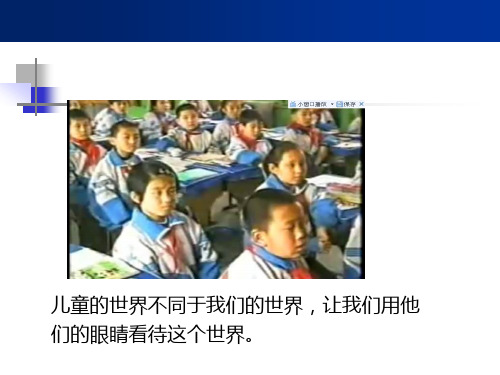教育心理学心理发展和个别差异42页PPT
合集下载
中小学生的心理发展与差异优秀PPT

继续使用具体运算阶段使用的教学策略与 教具。
为学生提供假设性问题的机会 如让学生就当今的社会问题写有明确立场 的论文,然后正反方辩论。
为学生提供解决问题与作出科学推论的机 会。 如组织小组讨论,设计实验回答相关问题
发展阶段的特点
①阶段出现的先后顺序固定不变,不能跨越, 也不能颠倒,具有普通性。
类似的环境中由于重复而引起迁移或概括。
适应
同化
个体在反映和作用于 环境(即与环境相互作 用)过程中,使客体 (外界事物)纳入已有 认知结构或行为模式中 的过程。
顺应
个体在其原有认知结构或 行为模式已不能使新的 经验同化时,便调整原有 认知结构或行为模式,以 适应环境变化的过程。
服务
平衡(equilibrium)指一切心理的成长(包括儿童智慧的发展)
②每一阶段都有其独特的认知结构,决定儿童 行为的一般特点。
③认知结构的发展是一个连续建构的过程,每 一个阶段都是前一阶段的延伸,是在新水平上 对前面阶段进行改组而形成新系统。
4、影响发展的因素
有机体的成长, 特别是神经系统 和内分泌系统的 成熟。 不是先决条件
发展
个体与环境相互 作用过程中的自 我调节
自我评价方面:开始由注重外 部表现的具体评价向以抽象慨 括为主的抽象评价转变,能够 把一些社会准则、道德规范纳 入自我评价之中
独立生活能力和 社会适应能力较 初中增强
...
智力水平接近成 人高峰状态 ...
动机层次提高,对 社会各方面的关心 程度增强,有一定 的评价能力...
高中生心理 发展特...征
同化:认知数量的扩展
个体运用其已有图式处理所面对的问题; 即将新事物纳入已有图式之内,是既有知 识的类推运用。
为学生提供假设性问题的机会 如让学生就当今的社会问题写有明确立场 的论文,然后正反方辩论。
为学生提供解决问题与作出科学推论的机 会。 如组织小组讨论,设计实验回答相关问题
发展阶段的特点
①阶段出现的先后顺序固定不变,不能跨越, 也不能颠倒,具有普通性。
类似的环境中由于重复而引起迁移或概括。
适应
同化
个体在反映和作用于 环境(即与环境相互作 用)过程中,使客体 (外界事物)纳入已有 认知结构或行为模式中 的过程。
顺应
个体在其原有认知结构或 行为模式已不能使新的 经验同化时,便调整原有 认知结构或行为模式,以 适应环境变化的过程。
服务
平衡(equilibrium)指一切心理的成长(包括儿童智慧的发展)
②每一阶段都有其独特的认知结构,决定儿童 行为的一般特点。
③认知结构的发展是一个连续建构的过程,每 一个阶段都是前一阶段的延伸,是在新水平上 对前面阶段进行改组而形成新系统。
4、影响发展的因素
有机体的成长, 特别是神经系统 和内分泌系统的 成熟。 不是先决条件
发展
个体与环境相互 作用过程中的自 我调节
自我评价方面:开始由注重外 部表现的具体评价向以抽象慨 括为主的抽象评价转变,能够 把一些社会准则、道德规范纳 入自我评价之中
独立生活能力和 社会适应能力较 初中增强
...
智力水平接近成 人高峰状态 ...
动机层次提高,对 社会各方面的关心 程度增强,有一定 的评价能力...
高中生心理 发展特...征
同化:认知数量的扩展
个体运用其已有图式处理所面对的问题; 即将新事物纳入已有图式之内,是既有知 识的类推运用。
教育心理学心理发展和个别差异

❖ 认知发展阶段具有普遍性 ❖ 认知发展阶段具有特殊性 ❖ 认知发展阶段制约教学的内容和方法 ❖ 教学促进学生的认知发展
皮亚杰理论对教学的启示
❖ 关注学生的思维水平(Awareness of student thinking)
❖ 知识是建构的(Individuals ‘construct’ knowledge)
形式运算阶段(Formal operations)
❖ 11 – 15岁 ❖ 假设-演绎推理(Hypothetico-deductive
reasoning) ❖ “科学”推理(‘Scientific’ reasoning) ❖ 青少年自我中心(Adolescent egocentrism)
认知发展阶段与教学
教育心理学
第二章 心理发展与个别差异
本章学习目标
❖ 识记概念:发展、心理发展、认知、图式、顺 应、同化、人格、社会性、自我意识、自我概 念、认知方式、场依存性、场独立性
❖ 掌握皮亚杰认知发展阶段理论及其对教学的意 义
❖ 掌握艾里克森人格发展阶段理论及其对教育的 意义
❖ 掌握个别差异的主要表现。能根据这些差异因 材施教
皮亚杰的认知发展阶段
❖ 感知运动阶段(Sensorimotor) ❖ 前运算阶段(Pre-operational) ❖具体运算阶段(Concrete operations) ❖形式运算阶段(Formal operations)
感知运动阶段(Sensorimotor)
❖ 0-2岁 ❖ 通过感觉学习(Learning through 5
❖ 教学与认知阶段相适应(‘Match’ teaching to cognitive stage)
❖ 用不平衡激励(Use disequilibrium to motivate)
皮亚杰理论对教学的启示
❖ 关注学生的思维水平(Awareness of student thinking)
❖ 知识是建构的(Individuals ‘construct’ knowledge)
形式运算阶段(Formal operations)
❖ 11 – 15岁 ❖ 假设-演绎推理(Hypothetico-deductive
reasoning) ❖ “科学”推理(‘Scientific’ reasoning) ❖ 青少年自我中心(Adolescent egocentrism)
认知发展阶段与教学
教育心理学
第二章 心理发展与个别差异
本章学习目标
❖ 识记概念:发展、心理发展、认知、图式、顺 应、同化、人格、社会性、自我意识、自我概 念、认知方式、场依存性、场独立性
❖ 掌握皮亚杰认知发展阶段理论及其对教学的意 义
❖ 掌握艾里克森人格发展阶段理论及其对教育的 意义
❖ 掌握个别差异的主要表现。能根据这些差异因 材施教
皮亚杰的认知发展阶段
❖ 感知运动阶段(Sensorimotor) ❖ 前运算阶段(Pre-operational) ❖具体运算阶段(Concrete operations) ❖形式运算阶段(Formal operations)
感知运动阶段(Sensorimotor)
❖ 0-2岁 ❖ 通过感觉学习(Learning through 5
❖ 教学与认知阶段相适应(‘Match’ teaching to cognitive stage)
❖ 用不平衡激励(Use disequilibrium to motivate)
心理发展及个体差异PPT课件

以人格发展也是按一定的成熟程度分阶段向前发展。
(1)乳儿期(0-1.5岁):基本的信任感对基本的不信任感 (2)婴儿期(1.5-3岁):基本的自主感对基本的羞怯感和疑虑 (3)学前期(3-6岁):基本的主动感对基本的内疚感 (4)学龄期(6-12岁):基本的勤奋感对基本的自卑感 (5)青少年期(12-18岁):基本的自我同一感对同一感混乱 (6)成年初期(18-25岁):基本的亲密感对基本的孤独感 (7)成年中期(25-60岁):基本的繁殖感对基本的停滞感 (8)成年晚期(60岁以上):基本的自我完善感对基本的绝望感
• 学习风格可以分为生理因素、心理因素和 社会因素三个层面。
• 心理因素又可分为认知、情感和意动三个 方面。
2021
32
邓恩学习风格要素及其表现(P72)
2021
33
2021
19
年 龄 发展任务
重要事件
发展顺利的表现
危机描述 危机未得到彻底解决的表现
出生~ 18个月
信任对怀疑
喂食
婴儿与看护者建立初步的爱与信 认为外在世界是不可靠的,在8个月 ~3岁
自主对羞怯
吃饭、穿衣、如 开始出现符合社会要求的自主性
厕训练
行为
缺乏信心,产生羞愧感
2021
15
2021
16
二、维果斯基的心理发展观
“维列鲁”学派:又称社会文化历史学派,是由前苏联心理学家维果 斯基和他的学生列昂节夫、鲁利亚为代表而形成的一个较大的心理学 派别。
• 认为心理发展是个体的心理从出生到成年,在环境和教育的影响下, 在低级心理机能的基础上,逐渐向高级心理机能转化的过程。(文化 历史发展理论)
977:322
4000:1
他还搜集了80对双生子的资料,企图证明人的心理完全是遗传的。
(1)乳儿期(0-1.5岁):基本的信任感对基本的不信任感 (2)婴儿期(1.5-3岁):基本的自主感对基本的羞怯感和疑虑 (3)学前期(3-6岁):基本的主动感对基本的内疚感 (4)学龄期(6-12岁):基本的勤奋感对基本的自卑感 (5)青少年期(12-18岁):基本的自我同一感对同一感混乱 (6)成年初期(18-25岁):基本的亲密感对基本的孤独感 (7)成年中期(25-60岁):基本的繁殖感对基本的停滞感 (8)成年晚期(60岁以上):基本的自我完善感对基本的绝望感
• 学习风格可以分为生理因素、心理因素和 社会因素三个层面。
• 心理因素又可分为认知、情感和意动三个 方面。
2021
32
邓恩学习风格要素及其表现(P72)
2021
33
2021
19
年 龄 发展任务
重要事件
发展顺利的表现
危机描述 危机未得到彻底解决的表现
出生~ 18个月
信任对怀疑
喂食
婴儿与看护者建立初步的爱与信 认为外在世界是不可靠的,在8个月 ~3岁
自主对羞怯
吃饭、穿衣、如 开始出现符合社会要求的自主性
厕训练
行为
缺乏信心,产生羞愧感
2021
15
2021
16
二、维果斯基的心理发展观
“维列鲁”学派:又称社会文化历史学派,是由前苏联心理学家维果 斯基和他的学生列昂节夫、鲁利亚为代表而形成的一个较大的心理学 派别。
• 认为心理发展是个体的心理从出生到成年,在环境和教育的影响下, 在低级心理机能的基础上,逐渐向高级心理机能转化的过程。(文化 历史发展理论)
977:322
4000:1
他还搜集了80对双生子的资料,企图证明人的心理完全是遗传的。
教育心理学- 心理发展与个别差异

形式运算阶段:11-成年岁
现实性
把这些球放到一个盒子里: 猜猜看,拿到黑球的可能是多少?拿 到白球的可能性是多少?拿到花球的 可能性是多少?
可能性
假设演绎思维
皮亚杰关于心理发展阶段论的观点:
1.心理发展表现为连续发展过程中 的阶段性。 2.每个阶段都具有独特的典型特征。 3.各阶段的发展次序的固定性。 4.前后相邻阶段之间具有连续性。
同一机能在发展的不同时间有不同的发展速度; 从身心总的发展来看,不同时期发展速度也不 同。
0-6岁 第一发展加
童年期 平稳
青春期 第二发展加
成人期 缓慢
老年期 下降变化
速期
发展期
速期
发展期
一、心理发展概述 3、 心理发展的普遍性和差异性
普遍性: 例如民间流传的“三翻、六坐、八爬”
发展进程:例如有的孩子先慢后快 差异性: 发展内容:例如有的孩子语言优势
发展水平:例如有的孩子发展迟缓
一、心理发展概述
4、 心理发展进程中连续性和阶段性的统一
(三)遗传与环境对心理发展的影响
1.遗传决定论
高尔顿:遗传定律 霍尔:一两遗传胜过一吨教育 詹森:智商80%来自遗传 2.环境决定论(教育万能论)
华生:“给我12个健全的形体良好的婴儿…”
3.二因素论 施太伦:遗传+环境 吴伟士:遗传 x 环境
4、相互作用论(皮亚杰)
遗传与环境相互依存、相互联系 遗传与环境相互渗透、相互 转化 遗传与环境的相互作用受到
个体主观能动性的影响
【讨论】你是如何成为现在的你的?
二、心理发展的主要理论
(一)皮亚杰的认知发展理论 (二)维果斯基的文化-历史发展理论 (三)艾里克森的人格发展八阶段论
教育心理学完整版ppt课件

性。
维果茨基的社会文化理论
社会互动与认知发展
维果茨基强调社会互动在认知发展中 的重要作用,认为语言和文化是认知 发展的重要媒介。
最近发展区
支架式教学
基于最近发展区的理念,教师或成人 可以通过提供适当的支持和指导,帮 助儿童跨越最近发展区,实现认知发 展。
维果茨基提出最近发展区的概念,即 儿童在成人或更有经验的同伴的帮助 下能够达到的潜在发展水平。
信息加工理论与认知发展
信息加工模型
信息加工理论将认知过程视为对信息的输入、编码、存储 和提取等加工过程,强调认知的主动性和策略性。
认知发展阶段
信息加工理论认为认知发展经历不同阶段,每个阶段有不 同的信息加工能力和特点。
工作记忆与认知发展
工作记忆在信息加工过程中起着重要作用,其容量和加工 速度限制了个体的认知表现和发展水平。通过训练和提高 工作记忆能力,可以促进认知发展。
鼓励学生尝试不同的学 习方式,培养多元化学 习能力。
特殊儿童的心理与教育
特殊儿童的表现:智力障碍、情感行为障碍、 学习障碍、自闭症等。
01
教育对策
02
04
注重特殊儿童的心理健康,提供心理咨询和 辅导服务。
05
加强家校合作,为特殊儿童提供全方位的 教育支持和关爱。
针对特殊儿童的不同类型和程度,制定个 别化教育计划,提供特殊教育支持。
教育心理学完整版ppt 课件
目录
• 教育心理学概述 • 学习心理 • 认知发展 • 情感与动机 • 个体差异与教育 • 教师心理
01
教育心理学概述
教育心理学的定义与研究对象
定义
教育心理学是研究教育教学过程 中人的心理活动及其规律的科学 。
研究对象
维果茨基的社会文化理论
社会互动与认知发展
维果茨基强调社会互动在认知发展中 的重要作用,认为语言和文化是认知 发展的重要媒介。
最近发展区
支架式教学
基于最近发展区的理念,教师或成人 可以通过提供适当的支持和指导,帮 助儿童跨越最近发展区,实现认知发 展。
维果茨基提出最近发展区的概念,即 儿童在成人或更有经验的同伴的帮助 下能够达到的潜在发展水平。
信息加工理论与认知发展
信息加工模型
信息加工理论将认知过程视为对信息的输入、编码、存储 和提取等加工过程,强调认知的主动性和策略性。
认知发展阶段
信息加工理论认为认知发展经历不同阶段,每个阶段有不 同的信息加工能力和特点。
工作记忆与认知发展
工作记忆在信息加工过程中起着重要作用,其容量和加工 速度限制了个体的认知表现和发展水平。通过训练和提高 工作记忆能力,可以促进认知发展。
鼓励学生尝试不同的学 习方式,培养多元化学 习能力。
特殊儿童的心理与教育
特殊儿童的表现:智力障碍、情感行为障碍、 学习障碍、自闭症等。
01
教育对策
02
04
注重特殊儿童的心理健康,提供心理咨询和 辅导服务。
05
加强家校合作,为特殊儿童提供全方位的 教育支持和关爱。
针对特殊儿童的不同类型和程度,制定个 别化教育计划,提供特殊教育支持。
教育心理学完整版ppt 课件
目录
• 教育心理学概述 • 学习心理 • 认知发展 • 情感与动机 • 个体差异与教育 • 教师心理
01
教育心理学概述
教育心理学的定义与研究对象
定义
教育心理学是研究教育教学过程 中人的心理活动及其规律的科学 。
研究对象
- 1、下载文档前请自行甄别文档内容的完整性,平台不提供额外的编辑、内容补充、找答案等附加服务。
- 2、"仅部分预览"的文档,不可在线预览部分如存在完整性等问题,可反馈申请退款(可完整预览的文档不适用该条件!)。
- 3、如文档侵犯您的权益,请联系客服反馈,我们会尽快为您处理(人工客服工作时间:9:00-18:30)。
❖ 同化(Assimilation)
interpreting one’s new experience in terms of one’s existing schemas
❖ 顺应(Accommodation)
adapting one’s current understandings (schemas) to incorporate new information
❖ 成功而合理地解决每个阶段的危机或冲突将使个体 形成积极的人格特征,发展健全的人格。
艾里克森理论的应用
❖ 建立信任( Trust: fill the child’s needs consistently )
❖ 发展自主性( Autonomy: Allow to experiment within safe bounds )
❖ 鼓励主动性( Initiative: Allow limited choices that will often result in success )
❖ 鼓励勤奋(Industry: help students set and achieve realistic goals)
❖ 发展包括:
生理发展 人格发展 社会性发展 认知发展
❖ 心理发展:是指个体从胚胎、出生、成熟、衰老到 死亡的整个生命进程中发生的一系列心理变化。
发展的一般规律
❖ 发展的速ly ) ❖ 发展是逐步产生的( Gradual )
本章学习目标
❖ 识记概念:发展、心理发展、认知、图式、顺 应、同化、人格、社会性、自我意识、自我概 念、认知方式、场依存性、场独立性
❖ 掌握皮亚杰认知发展阶段理论及其对教学的意 义
❖ 掌握艾里克森人格发展阶段理论及其对教育的 意义
❖ 掌握个别差异的主要表现。能根据这些差异因 材施教
发展的概念
❖ 发展:指个体从胚胎、出生、成熟、衰老到死亡的 整个生命进程中发生的变化。
皮亚杰的认知发展阶段
❖ 感知运动阶段(Sensorimotor) ❖ 前运算阶段(Pre-operational) ❖具体运算阶段(Concrete operations) ❖形式运算阶段(Formal operations)
感知运动阶段(Sensorimotor)
❖ 0-2岁 ❖ 通过感觉学习(Learning through 5
❖ 完善感对失望( Ego integrity / Despair: Late
艾里克森人格发展阶段理论(续)
❖ 艾里克森认为,儿童人格的发展是一个逐渐形成的 过程,必须经历8个顺序不变的阶段,其中前5个阶 段属于儿童成长和接受教育的时期。
❖ 每一个阶段都有一个有生物的成熟与社会文化环境、 社会期望之间的冲突和矛盾所决定的发展危机。
艾里克森人格发展阶段理论
❖ 信任对不信任( Trust / Mistrust: Birth to 12-18 months )
❖ 自主对羞耻与怀疑( Autonomy / Shame & Doubt: 18 months to 3 years )
❖ 主动对内疚( Initiative / Guilt: 3 to 6 years )
皮亚杰的术语
❖ 认知(Cognition)
mental activities associated with thinking, knowing, and remembering
❖ 图式( Schema )
a concept or framework that organizes and interprets information
senses) ❖ 客体永久性(Object permanence)(图示) ❖ 目的性行为(Goal directed activity)
前运算阶段(Pre-operational)
❖ 2-7岁 ❖ 自我中心(Egocentrism ) ❖ 单维思维(One-way logic) ❖ 守恒困难(Difficulty with centering &
❖ 勤奋对自卑( Industry / Inferiority: 6 to 12 years )
❖ 同一性对角色混乱( Identity / Role Confusion: Adolescents )
❖ 亲密对孤独(Intimacy / Isolation: Young adulthood)
❖ 繁殖对停滞(Generativity / Stagnation: Middle Adulthood
conservation) ❖ 集体独白(Collective monologue)
具体运算阶段(Concrete operations)
❖ 7 – 11岁 ❖ 多维思维(Two way logic) ❖ 守恒(Conservation) ❖ 分类(Classification) ❖ 排序(Seriation)
形式运算阶段(Formal operations)
❖ 11 – 15岁 ❖ 假设-演绎推理(Hypothetico-deductive
reasoning) ❖ “科学”推理(‘Scientific’ reasoning) ❖ 青少年自我中心(Adolescent egocentrism)
认知发展阶段与教学
❖ 教学与认知阶段相适应(‘Match’ teaching to cognitive stage)
❖ 用不平衡激励(Use disequilibrium to motivate)
人格的概念
❖ 人格:又称个性。指决定个体的外显行为和 内隐行为并使其与他人的行为有稳定区别的 综合心理特征。
❖ 人格主要使与他人相区别的个人特征。
❖ 认知发展阶段具有普遍性 ❖ 认知发展阶段具有特殊性 ❖ 认知发展阶段制约教学的内容和方法 ❖ 教学促进学生的认知发展
皮亚杰理论对教学的启示
❖ 关注学生的思维水平(Awareness of student thinking)
❖ 知识是建构的(Individuals ‘construct’ knowledge)
interpreting one’s new experience in terms of one’s existing schemas
❖ 顺应(Accommodation)
adapting one’s current understandings (schemas) to incorporate new information
❖ 成功而合理地解决每个阶段的危机或冲突将使个体 形成积极的人格特征,发展健全的人格。
艾里克森理论的应用
❖ 建立信任( Trust: fill the child’s needs consistently )
❖ 发展自主性( Autonomy: Allow to experiment within safe bounds )
❖ 鼓励主动性( Initiative: Allow limited choices that will often result in success )
❖ 鼓励勤奋(Industry: help students set and achieve realistic goals)
❖ 发展包括:
生理发展 人格发展 社会性发展 认知发展
❖ 心理发展:是指个体从胚胎、出生、成熟、衰老到 死亡的整个生命进程中发生的一系列心理变化。
发展的一般规律
❖ 发展的速ly ) ❖ 发展是逐步产生的( Gradual )
本章学习目标
❖ 识记概念:发展、心理发展、认知、图式、顺 应、同化、人格、社会性、自我意识、自我概 念、认知方式、场依存性、场独立性
❖ 掌握皮亚杰认知发展阶段理论及其对教学的意 义
❖ 掌握艾里克森人格发展阶段理论及其对教育的 意义
❖ 掌握个别差异的主要表现。能根据这些差异因 材施教
发展的概念
❖ 发展:指个体从胚胎、出生、成熟、衰老到死亡的 整个生命进程中发生的变化。
皮亚杰的认知发展阶段
❖ 感知运动阶段(Sensorimotor) ❖ 前运算阶段(Pre-operational) ❖具体运算阶段(Concrete operations) ❖形式运算阶段(Formal operations)
感知运动阶段(Sensorimotor)
❖ 0-2岁 ❖ 通过感觉学习(Learning through 5
❖ 完善感对失望( Ego integrity / Despair: Late
艾里克森人格发展阶段理论(续)
❖ 艾里克森认为,儿童人格的发展是一个逐渐形成的 过程,必须经历8个顺序不变的阶段,其中前5个阶 段属于儿童成长和接受教育的时期。
❖ 每一个阶段都有一个有生物的成熟与社会文化环境、 社会期望之间的冲突和矛盾所决定的发展危机。
艾里克森人格发展阶段理论
❖ 信任对不信任( Trust / Mistrust: Birth to 12-18 months )
❖ 自主对羞耻与怀疑( Autonomy / Shame & Doubt: 18 months to 3 years )
❖ 主动对内疚( Initiative / Guilt: 3 to 6 years )
皮亚杰的术语
❖ 认知(Cognition)
mental activities associated with thinking, knowing, and remembering
❖ 图式( Schema )
a concept or framework that organizes and interprets information
senses) ❖ 客体永久性(Object permanence)(图示) ❖ 目的性行为(Goal directed activity)
前运算阶段(Pre-operational)
❖ 2-7岁 ❖ 自我中心(Egocentrism ) ❖ 单维思维(One-way logic) ❖ 守恒困难(Difficulty with centering &
❖ 勤奋对自卑( Industry / Inferiority: 6 to 12 years )
❖ 同一性对角色混乱( Identity / Role Confusion: Adolescents )
❖ 亲密对孤独(Intimacy / Isolation: Young adulthood)
❖ 繁殖对停滞(Generativity / Stagnation: Middle Adulthood
conservation) ❖ 集体独白(Collective monologue)
具体运算阶段(Concrete operations)
❖ 7 – 11岁 ❖ 多维思维(Two way logic) ❖ 守恒(Conservation) ❖ 分类(Classification) ❖ 排序(Seriation)
形式运算阶段(Formal operations)
❖ 11 – 15岁 ❖ 假设-演绎推理(Hypothetico-deductive
reasoning) ❖ “科学”推理(‘Scientific’ reasoning) ❖ 青少年自我中心(Adolescent egocentrism)
认知发展阶段与教学
❖ 教学与认知阶段相适应(‘Match’ teaching to cognitive stage)
❖ 用不平衡激励(Use disequilibrium to motivate)
人格的概念
❖ 人格:又称个性。指决定个体的外显行为和 内隐行为并使其与他人的行为有稳定区别的 综合心理特征。
❖ 人格主要使与他人相区别的个人特征。
❖ 认知发展阶段具有普遍性 ❖ 认知发展阶段具有特殊性 ❖ 认知发展阶段制约教学的内容和方法 ❖ 教学促进学生的认知发展
皮亚杰理论对教学的启示
❖ 关注学生的思维水平(Awareness of student thinking)
❖ 知识是建构的(Individuals ‘construct’ knowledge)
